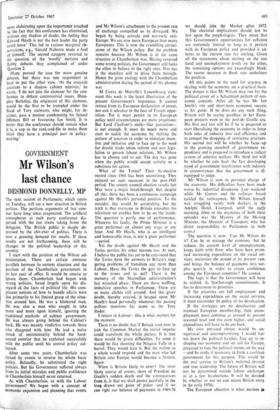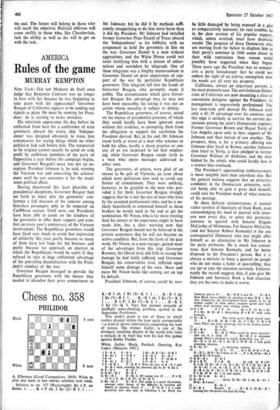Mr Wilson's last chance
GOVERNMENT DESMOND DONNELLY, MP
The next session of Parliament, which opens on Tuesday, will see a new situation in British politics. The partisan arguments of last sum- mer have long since evaporated. The artificial atmospheres at each party conference dis- persed with the last trains taking home the delegates. The British public is deeply de- pressed by the chit-chat of politics. There is now a growing demand for results. If these results are not forthcoming, there will be changes in the political leadership of this country.
I start with the position of the Wilson ad- ministration. There are certain ominous parallels between its current situation and the position of the Chamberlain government in its last year of office. It would be unwise to ignore them. Chamberlain had begun with wrong policies, based largely upon his dis- regard of the facts of political life. His com- placent notions of how to handle affairs were due primarily to his limited grasp of the situa- tion around him. He was a blinkered man. He was also a man who sought to take more and more upon himself, ignoring the traditional methods of cabinet government. He was always going behind the Cabinet's back. He was meanly vindictive towards those who disagreed with him. He had a naive streak of sentimentality behind the hard- coated exterior that he exploited successfully with the public until his central policy col- lapsed.
After some two years, Chamberlain was forced by events to reverse his whole basic Policy. Belatedly, he substituted the right policies. But his Government suffered always from its initial mistakes and public confidence in Chamberlain himself never returned.
As with Chamberlain, so with the Labour government? We began with a concept of economic expansion and planning that events and Mr Wilson's attachment to the present rate of exchange compelled us to disregard. We began by being actively and narrowly anti- Europe. We are now more European than many Europeans. This is now the crumbling corner- stone of the Wilson policy. But the problem remains because Mr Wilson is in the same situation as Chamberlain was. Having reversed some wrong policies, the Government still lacks the ethos to believe in the right ones. Nor has it the manifest will to drive them through.
Hence the grim analogy with the Chamberlain administration during the period of the phoney war.
M Couve de Murville's Luxembourg state- ment this week is the latest illustration of the present Government's impotence. It cannot
retreat from its European declaration of intent, nor can it advance in the face of French oppo-
sition. Yet it must persist in its European
policy until circumstances are more propitious. But Lord Chalfont's smile—like patriotism—
is not enough. It must do much more and start to tackle the economy by shifting the pattern of taxation in order to stimulate incen- tive and initiative and to face up to the need for drastic trade union reform and new legis- lation to govern labour relations. Mr Wilson has to choose and to act. The day has gone when the public would accept activity as a substitute for action.
What of the Tories? Their by-election record since 1966 has been astonishing. They enjoyed no such successes in the post-1945 period. The county council election results last May were a major breakthrough. But, despite all this, there has been a continuous campaign against Mr Heath's personal position. To the outsider, this would be astonishing, but the truth is that everyone in Britain considers his television set enables him to be on the inside. The question is partly one of performance.
Whatever his faults, the Prime Minister is a great performer on almost any stage at any hour. And Mr Heath, who is_ an intelligent and honourable man, is not a great performer —period.
Yet the doubt against Mr Heath and the Tories persists for other reasons too. At root, I believe the public has yet to be convinced that the Tories have the answers to Britain's stag- gering problems of transition any more than Labour. Have the Tories the guts to face up to the issues and to act? There is the memory of the Macmillan administration's last wretched phase. There are those waffling, indecisive speeches in Parliameat. There are so many clichés still around. And this grave doubt, thereby created, is heaped upon Mr Heath's head personally whenever the passing pollster mentions his name as the Tory leader.
I return to Labour: this is what matters for the moment.
There is no doubt that if Britain were ever to join the Common Market the initial impetus could transform the whole picture. It is true there would be grave difficulties. To some it would be like shooting the Niagara Falls in a
barrel. They would hate it. But the nation as a whole would respond and the man who led Britain into Europe would become a historic figure.
When is Britain likely to enter? The most likely course of events, short of President de Gaulle's sudden death and the consequences from it, is that we shall persist painfully in the long drawn out game of poker—and if we can right our balance of payments in 1969-70 we should join the Market after 1972. The electoral implications should not be lost upon the psephologists. They mean that this Government's opportunities for reflation are extremely limited so long as it persists with its European policy and provided it ad- heres to the current rate for sterling. Given all the statements about sterling on the one hand and unemployment levels on the other, the remaining options are exceedingly bleak. The recent increase in Bank rate underlines the position.
All this points to the need for urgency in dealing with the economy on a practical basis.
The danger is that Mr Wilson may run for the political cover of a Schachtian pattern of eco- nomic controls. After all, he has Mr Ian
Smith's VD! and short-term economic success
as his guide. If he does do any such thing, Britain will be saying goodbye to her Euro- pean projects even in the post-de Gaulle era. His first real test will be if he is prepared to start liberalising the economy in order to force both sides of industry into real efficiency and to compel the dropping of restrictive practices. His second test will be whether he faces up to the growing snowball of government ex- penditure and is prepared to introduce a radical system of selective welfare. His third test will be whether he cuts back the fast developing trend of government interference with industry in circumstances that the government is ill- equipped to judge.
Mr Wilson is now in personal charge of the economy. His difficulties have been made worse by industrial dissension. Last weekend while Mr Gunter and the railways board tackled the railwaymen, Mr Wilson himself was struggling vainly with dockers in the Adelphi Hotel, Liverpool, until the ea& morning. (One of the mysteries of both these episodes was the Mystery of the Missing Minister, the Minister of Transport, who has direct responsibility to Parliament in both cases.) The question is now: Can Mr Wilson do it? Can he so manage the economy that he reduces the current level of unemployment, keeps faith with those who have been prom- ised increasing expenditure on the social ser- vices, maintains the pound at its present rate, and brings the balance of payments into sur- plus quickly in order to create confidence among the European countries? He cannot.
The logic is that the Government will have to rethink its Scarborough commitments. It has to determine its priorities.
If the priorities are full employment and increasing expenditure on the social services, it must reconsider its policy of no devaluation.
If the strategies are no devaluation and eventual European membership, then unem- ployment must continue at around its present seasonal level and rise even higher, and social expenditure will have to be cut back.
My own personal choice would be un- equivocal and uncompromising. I would bat- ten down the political hatches, face up to re- shaping our economy and set sail for Europe, prepared to face the political storms on the way —and be ready if necessary to form a coalition government for this purpose. This would be the real service to Britain's national ,interest and true leadership. The future of Britain will not be determined outside labour exchanges or at a few by-elections. It will be decided by whether or not we can secure British entry in the early 1970s.
The European objective is what matters in the end. The future will belong to those who will reach the obiective. Political oblivion will come swiftly to those who, like Chamberlain, lack the ability as well as the will to get on with the task.











































 Previous page
Previous page